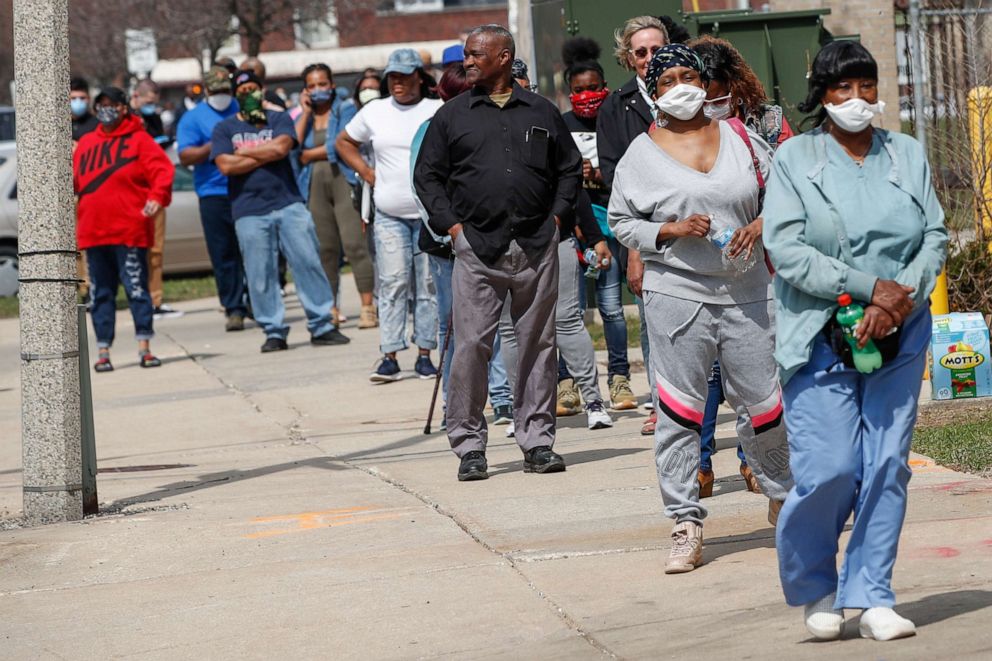The Note: Trump counterprograms for his base, as COVID-19 continues its spread
The TAKE with Rick Klein
A reality-star president knows how to program -- and also how to counterprogram.
With COVID-19's spread unchecked, and with now more than 130,000 fatalities in the United States, President Donald Trump is focused on his political base -- or, at least, an interpretation of it. He is focusing on preserving "heritage" and protecting monuments, attacking sports franchises and Democrats, while his White House suggests that the U.S. response to the virus is the envy of the world.
This does not reflect reality as lived by most Americans at the moment. That, though, maybe be the point.
There's this reporting from The Washington Post, citing "three people familiar with the White House's thinking": "White House officials also hope Americans will grow numb to the escalating death toll and learn to accept tens of thousands of new cases a day."

Beyond any such cynicism, the president appears intent on changing the subject. And there are signs that it's working, at least for his political base: In the latest Gallup Poll, Trump's approval rating among Republicans actually went up six points, from 85 to 91 percent, since their last poll a month ago.
Softening numbers among independents are keeping the president's overall approval numbers low, at 38 percent, in what's been perhaps the most dismal phase of his presidency.
So are the tweeted attacks pure recklessness? A lack of message discipline? An inability for strategists to influence the famous "audience of one"? Perhaps.
But they are just as likely manifestations of the president's faith in his own instincts. Inside of this is an implicit admission that Trump can only win a second term if he gets his base back to more comfortable -- and yes, more polarizing -- terrain.
The RUNDOWN with MaryAlice Parks
By midday Monday, President Trump, online, had gone on the offensive against NASCAR's only major Black driver, defended two the most controversial and racially-charged team names in professional sports, called the coronavirus the "China Virus," and defended the Confederate flag.
In short, his propensity for displays of casual racism and use of divisive political speech is ramping up with each passing week this summer.

Republican Sen. Lindsey Graham, a staunch ally of the president, was not interested in defending Trump's words. He said on Fox News Radio Monday that he didn't think NASCAR driver Bubba Wallace, for example, had "anything to apologize for" as the president had stated.
The cracks and distancing are not just showing in the party, but within the executive branch too. Despite the president's online statements, the Pentagon is in fact getting closer to issuing a policy that would ban the confederate flag on bases. Of course, it will be interesting to see how President Trump will react if the Pentagon issues such a policy.
The TIP with Alisa Wiersema
Tuesday's primaries sound like a game of political Mad Libs as the contests in Delaware and New Jersey are set to feature a presidential candidate's home state, the aftermath of political party-switching, a Kennedy family member, and references to MTV's Jersey Shore. They also offer a glimpse into how some of November's most-watched House contests could begin to play out.
In New Jersey, a crucial Democratic primary will determine who goes on to challenge freshman Rep. Jeff Van Drew, who defected to become a Trump-backing Republican late last year. The choice for Democrats in the Garden State who are desperate to reclaim their district as blue territory now falls between Amy Kennedy, a former public school teacher and mental health advocate with a famous family connection, and Brigid Callahan Harrison, a political science professor. Both women have accumulated high-profile endorsements, and whoever comes out on top will show whether voters will retaliate against Van Drew in the fall.

To the north, freshman Rep. Andy Kim is running unopposed in the district's Democratic primary, but he faces a tough reelection campaign as an incumbent in a district Trump won in 2016. His challengers include former GOP candidate David Richter, who hopped districts after Van Drew's party switch in New Jersey's second district, and former union executive Kate Gibbs. The lead-up to Tuesday's contest featured political theatrics including a campaign ad from Richter that attempted to paint himself as a traditional family man, while tying Gibbs' past minor infractions to sloppy behavior seen on MTV's Jersey Shore.
In Delaware, things are a little less heated as voters are set to cast ballots in presidential primaries that have been all but decided. While Joe Biden's home state does not permit early voting, vote-by-mail or no-excuse absentee voting, an order from Gov. John Carney earlier this year allowed for voters to use the coronavirus as an excuse to request and cast absentee ballots. While in-person voting remains an option for Tuesday, according to a Biden campaign official, the former vice president and Dr. Jill Biden voted absentee, and returned their ballots in person to the New Castle County board of elections last week.
THE PLAYLIST
ABC News' "Start Here" podcast. Tuesday morning's episode features ABC News Chief Medical correspondent Dr. Jennifer Ashton, who tells us what we should know about possible airborne spread of COVID-19 as cases continue to surge in 37 states. ABC News contributor John Cohen tells us what's behind an uptick in gun violence in many major cities. And, ABC News Senior Washington reporter Devin Dwyer breaks down the latest Supreme Court rulings on the Electoral College and robocalls. http://apple.co/2HPocUL
WHAT YOU NEED TO KNOW TODAY
Download the ABC News app and select "The Note" as an item of interest to receive the day's sharpest political analysis.
The Note is a daily ABC News feature that highlights the key political moments of the day ahead. Please check back tomorrow for the latest.




